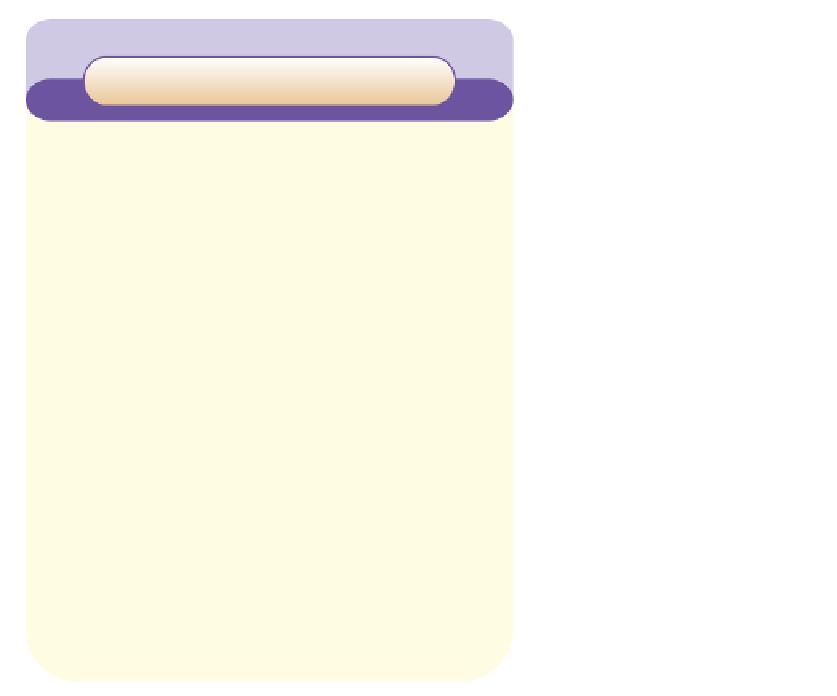Environmental Engineering Reference
In-Depth Information
tablets saturates the thyroid gland and blocks the uptake
of radioactive iodine isotopes released by a nuclear acci-
dent. In 1997, French officials began distributing potas-
sium iodide tablets to 600,000 people living within 10
kilometers (6 miles) of its 24 nuclear power installations.
Has such action been taken in the country where you
live? If not, why not?
6.
Would you favor having high-level nuclear waste
transported by truck or train through the area where you
live to a centralized underground storage site? Explain.
What are the options?
7.
Someone tells you that we can save energy by recy-
cling it. How would you respond?
8.
Should gas-guzzling motor vehicles be taxed heavily?
Explain. Should buyers of energy-efficient motor vehicles
receive large government subsidies, funded by the taxes
on gas-guzzlers? Explain.
9.
Explain why you agree or disagree with the following
proposals made by various energy analysts:
a.
Government subsidies for all energy alternatives
should be eliminated so all energy choices can com-
pete in a true free-market system.
b.
All government tax breaks and other subsidies for
conventional fuels (oil, natural gas, and coal), syn-
thetic natural gas and oil, and nuclear power (fis-
sion and fusion) should be phased out. They
should be replaced with subsidies and tax breaks
for improving energy efficiency and developing so-
lar, wind, geothermal, hydrogen, and biomass en-
ergy alternatives.
c.
Development of solar, wind, and hydrogen energy
should be left to private enterprise and receive little
or no help from the federal government, but nu-
clear energy and fossil fuels should continue to re-
ceive large federal subsidies.
10.
Congratulations! You are in charge of the world. List
the five most important features of your energy policy.
What Can You Do?
Energy Use and Waste
• Drive a car that gets at least 15 kilometers per liter
(35 miles per gallon) and join a carpool.
• Use mass transit, walking, and bicycling.
• Superinsulate your house and plug all air leaks.
•Turn off lights, TV sets, computers, and other
electronic equipment when they are not in use.
•Wash laundry in warm or cold water.
• Use passive solar heating.
• For cooling, open windows and use ceiling fans
or whole-house attic or window fans.
•Turn thermostats down in winter and up in summer.
• Buy the most energy-efficient homes, lights, cars,
and appliances available.
•Turn down the thermostat on water heaters to
43-49
°
C (110-120
°
F) and insulate hot water
heaters and pipes.
Figure 13-48
Individuals matter:
ways to reduce your use
and waste of energy.
Critical thinking: which three of these
actions do you believe are the most important? Which things in
the list do you do or plan to do?
CRITICAL THINKING
1.
To continue using oil at the current rate (not the pro-
jected higher exponential increase in its annual use), we
must discover and add to global oil reserves the equiva-
lent of a new Saudi Arabian supply (the world's largest)
every 10 years.
Do you believe this is possible? If not, what
effects might this failure have on your life and on the
lives of your children or grandchildren?
2.
List five actions you can take to reduce your depen-
dence on oil and the gasoline derived from it. Which of
these things do you actually plan to do?
3.
Are you for or against continuing to increase oil im-
ports in the United States or in the country where you
live? If you favor reducing dependence on oil imports,
list the three best ways to do so.
4.
Explain why you agree or disagree with the following
proposals made by various energy analysts as means to
solve energy problems:
a.
Find and develop more domestic supplies of oil
b.
Place a heavy federal tax on gasoline and imported
oil to help reduce the waste of oil resources
c.
Increase dependence on nuclear power
d.
Phase out all nuclear power plants by 2025
5.
After a nuclear accident or terrorist attack, exposed
children and adults can take iodine tablets to help pre-
vent thyroid cancer. The stable isotope of iodine in the
LEARNING ONLINE
The website for this topic includes review questions for
the entire chapter, flash cards for key terms and concepts,
a multiple-choice practice quiz, interesting Internet sites,
references, and a guide for accessing thousands of
InfoTrac
®
College Edition articles.
Visit
http://biology.brookscole.com/miller11
Then choose Chapter 13, and select a learning resource.
For access to animations, additional quizzes, chapter out-
lines and summaries, register and log in to
at
esnow.brookscole.com/miller11
using the access code
card in the front of your topic.
Active Graphing
Visit
http://esnow.brookscole.com/miller11
to
explore the graphing exercise for this chapter.






